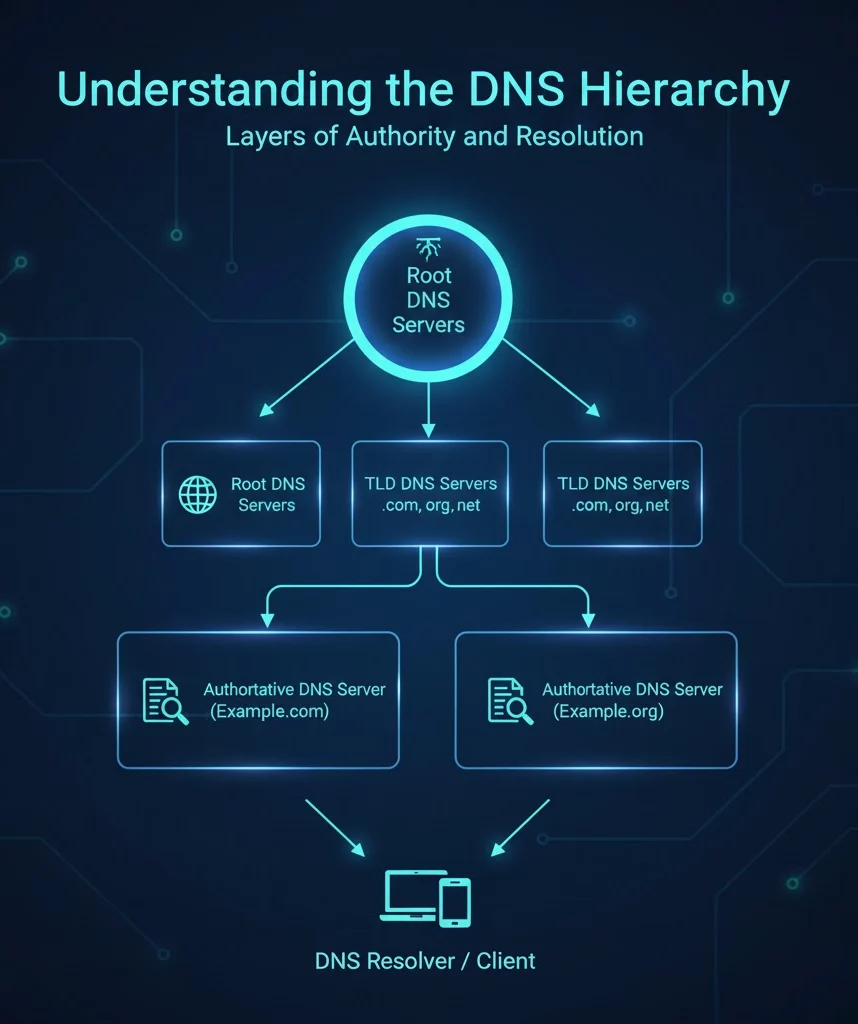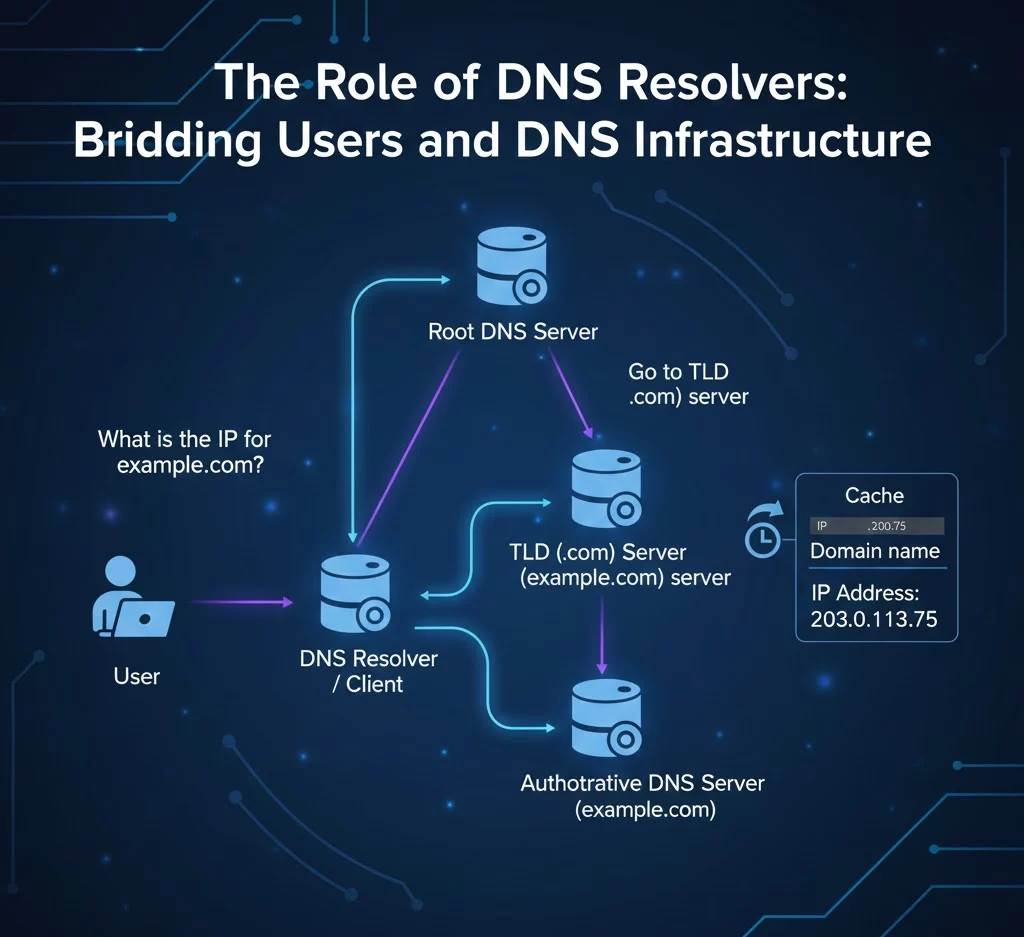What is the Domain Name System, the DNS?

The Domain Name System (DNS) stands as a fundamental component that underpins seamless communication and accessibility across digital networks. While users navigate the internet using familiar domain names, such as google.com or facebook.com, behind the scenes, DNS quietly performs the vital task of translating these human-readable domain names into machine-readable IP addresses, facilitating the flow of data packets across the global network. Let’s unravel what DNS is and explore its role in enabling the World Wide Web.
Table of Contents
Roles of DNS: Translating Domain Names to IP Addresses
DNS serves as a distributed directory system that maps domain names to their corresponding IP addresses, allowing users to access websites, send emails, and communicate across the internet using familiar and meaningful identifiers.
This process, known as DNS resolution, involves a hierarchical structure of DNS servers, each responsible for a specific domain or zone, collectively forming the DNS hierarchy. When a user enters a domain name into a web browser or other network-enabled application, the DNS resolver queries the DNS infrastructure to obtain the corresponding IP address, enabling seamless connectivity and accessibility to online resources.
Understanding the DNS Hierarchy: Layers of Authority and Resolution

The DNS hierarchy consists of multiple layers of authority and resolution, each serving a specific role in the process of domain name resolution. At the top of the hierarchy are the root DNS servers, which maintain the authoritative records for the root zone of the DNS namespace. Underneath the root servers are the top-level domain (TLD) servers, responsible for managing domain names within specific TLDs such as .com, .org, or .net. Further down the hierarchy are the authoritative DNS servers, which maintain authoritative records for individual domain names or zones, providing resolution services to DNS resolvers and clients.
The Role of DNS Resolvers: Bridging Users and DNS Infrastructure

DNS resolvers, also known as recursive resolvers, play a crucial role in the DNS resolution process by acting as intermediaries between users and the DNS infrastructure. When a user initiates a DNS query by entering a domain name into a web browser, the resolver begins the resolution process by querying the root DNS servers to obtain the authoritative servers responsible for the requested domain.
Through iterative queries, the resolver traverses the DNS hierarchy, resolving domain names and obtaining the corresponding IP addresses until it reaches the authoritative server for the requested domain. Once the IP address is obtained, the resolver caches the result for future use, optimizing performance and reducing latency for subsequent queries.
DNS Security and Resilience: Mitigating Threats and Ensuring Reliability
In addition to facilitating domain name resolution, DNS plays a crucial role in ensuring the security and resilience of Internet communication. DNS security mechanisms, such as Domain Name System Security Extensions (DNSSEC), provide cryptographic authentication and integrity verification for DNS responses, mitigating the risk of DNS spoofing, cache poisoning, and other malicious attacks. Moreover, DNS employs redundancy and fault tolerance mechanisms, such as Anycast routing and DNS-based load balancing, to ensure the reliability and availability of DNS services, even in the face of network disruptions or targeted attacks.
Conclusion: Domain Name System's Functions in Internet Communication
In conclusion, the Domain Name System (DNS) serves as a cornerstone of Internet communication, enabling users to navigate the web using familiar domain names and facilitating seamless connectivity and accessibility across digital networks. Through its hierarchical structure, resolution process, and security mechanisms, DNS ensures the reliable and efficient translation of domain names to IP addresses, empowering individuals, businesses, and communities to harness the full potential of the interconnected world of cyberspace. As the internet continues to evolve and expand, the role of DNS remains indispensable, driving innovation and connectivity in the digital age.
Trusted IPv4 Leasing for Business Growth
Get enterprise-grade IPv4 space quickly, with seamless deployment and end-to-end management.
Get Started with i.leaseFAQs
Can changing my DNS server speed up my internet?
Yes, potentially. While DNS doesn’t increase your bandwidth (download speed), switching to a fast public DNS like Google (8.8.8.8) or Cloudflare (1.1.1.1) can resolve domain names faster than your ISP’s default server. This makes websites start loading sooner, making your browsing experience feel snappier.
What is the difference between an Authoritative and a Recursive DNS server?
-
Recursive Resolver: The “middleman” (usually your ISP) that goes out and finds the IP address for you.
-
Authoritative Server: The “final source of truth” that actually holds the specific IP record for a domain (e.g., the server holding the record for
google.com).
What is a DNS Leak?
A DNS leak happens when you are using a VPN to hide your location, but your computer accidentally sends DNS requests through your normal ISP instead of the VPN tunnel. This reveals your browsing history to your ISP, defeating the purpose of the VPN.
Related Posts

Inbound vs. Outbound IPv4 Leasing: A Complete Guide for Enterprises
Understanding IPv4 leasing helps enterprises manage scarce address space, reducing risk and unlocking strategic growth opportunities in today’s digital economy. Key points Distinguishes between inbound (leasing in) and outbound (leasing out) IPv4 approaches and their strategic implications. Highlights contract structures, registry risk management and continuity considerations affecting global number resources. Inbound vs. outbound IPv4 leasing: complete enterprise guide In the post-exhaustion era of Internet Protocol version 4 (IPv4),Read more Related Posts Inbound vs. Outbound IPv4 Leasing: A Complete Guide for Enterprises Understanding IPv4 leasing helps enterprises manage scarce address space, reducing risk and unlocking strategic growth opportunities in today’s digital economy. Key Read more Common Myths About Selling IP Addresses The IPv4 secondary market is often shrouded in mystery, leading many organizations to sit on valuable digital assets because they Read more How to turn idle IPv4 addresses into a recurring revenue stream with iLease Unlock the hidden value of unused IPv4 addresses with iLease, turning dormant digital infrastructure into a recurring revenue stream while Read more .related-post {} .related-post .post-list { text-align: left; } .related-post .post-list .item { margin: 5px; padding: 10px; } .related-post .headline { font-size: 18px !important; color: #999999 !important; } .related-post .post-list .item .post_thumb { max-height: 220px; margin: 10px 0px; padding: 0px; display: block; } .related-post .post-list .item .post_title { font-size: 16px; color: #3f3f3f; margin: 10px 0px; padding: 0px; display: block; text-decoration: none; } .related-post .post-list .item .post_excerpt { font-size: 13px; color: #3f3f3f; margin: 10px 0px; padding: 0px; display: block; text-decoration: none; } @media only screen and (min-width: 1024px) { .related-post .post-list .item { width: 30%; } } @media only screen and (min-width: 768px) and (max-width: 1023px) { .related-post .post-list .item { width: 90%; } } @media only screen and (min-width: 0px) and (max-width: 767px) { .related-post .post-list .item { width: 90%; } }

Common Myths About Selling IP Addresses
The IPv4 secondary market is often shrouded in mystery, leading many organizations to sit on valuable digital assets because they fear the perceived complexity or legal “gray areas.” As IPv4 exhaustion becomes a permanent reality, the value of these addresses has skyrocketed, yet misconceptions continue to stall potential transactions. At i.lease, powered by the real-world expertise of LARUS, we’ve seen how these myths prevent companies from unlocking significant capital.Read more Related Posts Inbound vs. Outbound IPv4 Leasing: A Complete Guide for Enterprises Understanding IPv4 leasing helps enterprises manage scarce address space, reducing risk and unlocking strategic growth opportunities in today’s digital economy. Key Read more Common Myths About Selling IP Addresses The IPv4 secondary market is often shrouded in mystery, leading many organizations to sit on valuable digital assets because they Read more How to turn idle IPv4 addresses into a recurring revenue stream with iLease Unlock the hidden value of unused IPv4 addresses with iLease, turning dormant digital infrastructure into a recurring revenue stream while Read more .related-post {} .related-post .post-list { text-align: left; } .related-post .post-list .item { margin: 5px; padding: 10px; } .related-post .headline { font-size: 18px !important; color: #999999 !important; } .related-post .post-list .item .post_thumb { max-height: 220px; margin: 10px 0px; padding: 0px; display: block; } .related-post .post-list .item .post_title { font-size: 16px; color: #3f3f3f; margin: 10px 0px; padding: 0px; display: block; text-decoration: none; } .related-post .post-list .item .post_excerpt { font-size: 13px; color: #3f3f3f; margin: 10px 0px; padding: 0px; display: block; text-decoration: none; } @media only screen and (min-width: 1024px) { .related-post .post-list .item { width: 30%; } } @media only screen and (min-width: 768px) and (max-width: 1023px) { .related-post .post-list .item { width: 90%; } } @media only screen and (min-width: 0px) and (max-width: 767px) { .related-post .post-list .item { width: 90%; } }

How to buy IPv4 addresses through a certified IP broker
Buying IPv4 space requires policy compliance, verified need, and registry approval, making certified IP brokers essential guides through complex global transfers. IPv4 transactions are regulated transfers, not simple purchases — registries must approve documentation, justification and registration changes. Certified brokers reduce risk and delay by aligning buyers with registry policy, routing legitimacy and cross-region requirements. Why companies still need to buy IPv4 addresses The global supply of IPv4 addressesRead more Related Posts Inbound vs. Outbound IPv4 Leasing: A Complete Guide for Enterprises Understanding IPv4 leasing helps enterprises manage scarce address space, reducing risk and unlocking strategic growth opportunities in today’s digital economy. Key Read more Common Myths About Selling IP Addresses The IPv4 secondary market is often shrouded in mystery, leading many organizations to sit on valuable digital assets because they Read more How to turn idle IPv4 addresses into a recurring revenue stream with iLease Unlock the hidden value of unused IPv4 addresses with iLease, turning dormant digital infrastructure into a recurring revenue stream while Read more .related-post {} .related-post .post-list { text-align: left; } .related-post .post-list .item { margin: 5px; padding: 10px; } .related-post .headline { font-size: 18px !important; color: #999999 !important; } .related-post .post-list .item .post_thumb { max-height: 220px; margin: 10px 0px; padding: 0px; display: block; } .related-post .post-list .item .post_title { font-size: 16px; color: #3f3f3f; margin: 10px 0px; padding: 0px; display: block; text-decoration: none; } .related-post .post-list .item .post_excerpt { font-size: 13px; color: #3f3f3f; margin: 10px 0px; padding: 0px; display: block; text-decoration: none; } @media only screen and (min-width: 1024px) { .related-post .post-list .item { width: 30%; } } @media only screen and (min-width: 768px) and (max-width: 1023px) { .related-post .post-list .item { width: 90%; } } @media only screen and (min-width: 0px) and (max-width: 767px) { .related-post .post-list .item { width: 90%; } }